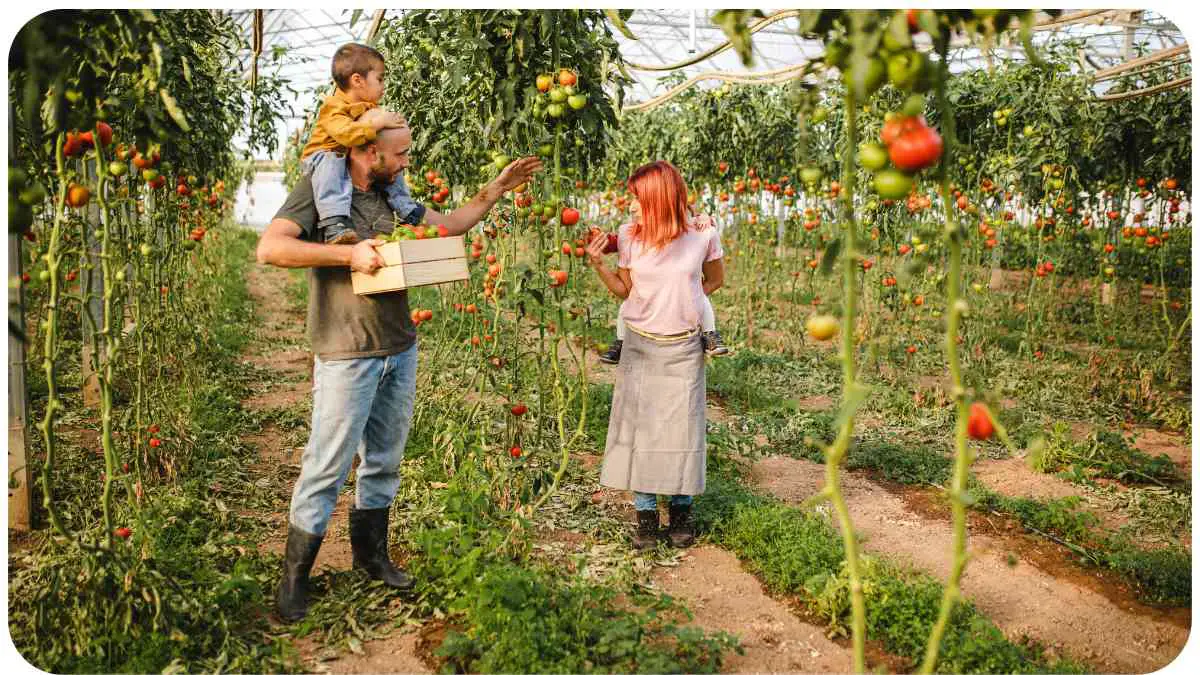In recent years, the concept of veganism has transcended mere dietary choice to become a lifestyle embraced by many. For parents, adopting a vegan lifestyle extends beyond personal health to encompass the well-being of their children and the planet. In this article, we’ll delve into why vegan parenting is not just a trend but a conscientious choice for the environment.
| Takeaways |
|---|
| 1. Vegan parenting promotes compassion for |
| animals, environmental sustainability, |
| and health-conscious living. |
| 2. Plant-based diets significantly reduce |
| the environmental footprint associated |
| with food production. |
| 3. Children can obtain all necessary |
| nutrients for healthy growth and |
| development from a well-planned vegan diet. |
| 4. Vegan parenting involves careful planning |
| and attention to ensure children receive |
| balanced nutrition. |
| 5. Adopting eco-friendly practices beyond |
2. Understanding Vegan Parenting

Vegan parenting involves raising children on a plant-based diet, free from animal products such as meat, dairy, eggs, and honey. It emphasizes compassion for animals, environmental sustainability, and health-conscious living. While some may question the feasibility of providing adequate nutrition through plant-based foods alone, numerous studies and real-life examples showcase the viability and benefits of this approach.
Transitioning to a vegan lifestyle can significantly reduce our ecological footprint, mitigating environmental degradation and preserving our planet’s resources for future generations.” A Look into Sustainability
3. Benefits of Vegan Parenting for the Environment
Table: Environmental Impact Comparison
| Aspect | Vegan Diet | Non-Vegan Diet |
|---|---|---|
| Carbon Footprint | Lower | Higher |
| Water Usage | Reduced | Increased |
| Land Consumption | Minimal | Extensive |
| Deforestation | Less Impact | Significant |
| Greenhouse Gas Emissions | Decreased | Elevated |
Vegan parenting significantly reduces the environmental footprint associated with food production compared to conventional diets.
By opting for plant-based alternatives, parents contribute to lower carbon emissions, reduced water usage, and mitigated deforestation. This conscious choice aligns with the urgent need to address climate change and preserve natural resources for future generations.
4. Plant-Based Nutrition for Kids

One common concern surrounding vegan parenting is whether children can obtain all the necessary nutrients for healthy growth and development solely from plant-based foods. Contrary to misconceptions, a well-planned vegan diet can meet all nutritional requirements, providing ample vitamins, minerals, protein, and essential fatty acids essential for children’s health.
Living a sustainable vegan lifestyle involves conscious choices in consumption, transportation, and energy use, fostering a harmonious relationship with the environment while upholding ethical principles of compassion and preservation.” Living a Sustainable Vegan Lifestyle
Table: Essential Nutrients in Plant-Based Foods
| Nutrient | Plant-Based Sources |
|---|---|
| Protein | Legumes (beans, lentils, chickpeas), tofu, tempeh, nuts, seeds |
| Calcium | Fortified plant milk, tofu, leafy greens, almonds, figs |
| Iron | Lentils, spinach, tofu, quinoa, fortified cereals |
| Vitamin B12 | Fortified foods (nutritional yeast, plant milk, cereals) |
| Omega-3 Fatty Acids | Flaxseeds, chia seeds, walnuts, hemp seeds, algae oil |
By incorporating a variety of nutrient-dense plant foods into their children’s diets, vegan parents can ensure they receive adequate nutrition for optimal health and well-being.
5. Addressing Concerns and Misconceptions
Despite the growing popularity of veganism, misconceptions persist regarding its suitability for children. One common misconception is that vegan diets lack sufficient protein, which is essential for growth. However, plant-based sources such as beans, lentils, tofu, and quinoa provide ample protein to support children’s development.
Another concern is the adequacy of vitamins and minerals, particularly vitamin B12 and iron. While these nutrients are primarily found in animal products, fortified foods and supplements offer vegan-friendly alternatives to meet children’s needs effectively.
6. Tips for Raising Vegan Kids
Raising vegan children involves careful planning and attention to ensure they receive balanced nutrition. Here are some practical tips for parents embarking on a vegan parenting journey:
- Educate Yourself: Learn about the nutritional needs of children and explore diverse plant-based foods to create balanced meals.
- Lead by Example: Set a positive example by embracing a vegan lifestyle yourself and involving children in meal preparation.
- Consult a Healthcare Professional: Seek guidance from a registered dietitian or pediatrician to address any concerns and ensure children’s nutritional requirements are met.
- Variety is Key: Encourage children to try a variety of fruits, vegetables, grains, and legumes to ensure they receive a broad spectrum of nutrients.
- Supplementation: Consider incorporating vitamin B12 and vitamin D supplements, as well as algae-based omega-3 supplements, to support children’s health.
The profound impact of a vegan diet on environmental sustainability encompasses reduced greenhouse gas emissions, minimized water usage, and mitigated deforestation, making it a pivotal choice in combating climate change and preserving biodiversity.” The Environmental Impact of a Vegan Diet
7. Environmental Consciousness Beyond Diet
Vegan parenting extends beyond dietary choices to instill values of environmental consciousness and sustainability in children. By opting for eco-friendly alternatives in various aspects of life, parents can impart valuable lessons about reducing waste, conserving resources, and protecting the planet for future generations.
Table: Eco-Friendly Practices for Vegan Families
| Aspect | Eco-Friendly Practices |
|---|---|
| Clothing | Choosing organic cotton, hemp, or sustainable fabrics |
| Household Products | Using cruelty-free, biodegradable cleaning products |
| Transportation | Opting for public transportation, cycling, or electric vehicles |
| Waste Reduction | Recycling, composting, minimizing single-use plastics |
| Ethical Consumerism | Supporting eco-conscious brands and ethical businesses |
By incorporating these eco-friendly practices into their daily lives, vegan families can make a positive impact on the environment while raising socially responsible children.
8. Vegan Parenting: A Personal Journey

Embarking on a vegan parenting journey is not without its challenges, but many families find it immensely rewarding. From navigating social situations to addressing nutritional concerns, each family’s experience is unique. However, the shared commitment to compassion, sustainability, and ethical living unites vegan parents in a supportive community.
Engaging in vegan activism empowers individuals to advocate for environmental conservation, animal welfare, and social justice, catalyzing positive change and inspiring collective action towards building a more sustainable and compassionate world.” Vegan Activism: Making a Difference
Anecdote: Navigating Social Settings
As a vegan parent, I’ve encountered various challenges when attending social gatherings or family events where animal products are prevalent. However, by communicating my dietary preferences respectfully and offering to bring vegan dishes to share, I’ve found that most people are accommodating and curious to learn more about plant-based eating.
Embracing veganism as the future of food revolutionizes our global food system, promoting plant-based alternatives that are environmentally sustainable, ethically sound, and nutritionally superior, paving the way for a healthier and more resilient future for all.” Veganism: The Future of Food
9. Conclusion
In conclusion, vegan parenting offers a holistic approach to child-rearing that prioritizes compassion for animals, environmental sustainability, and health-conscious living. By raising children on a plant-based diet and instilling values of empathy and eco-consciousness, parents not only nurture the well-being of their families but also contribute to a more compassionate and sustainable world.
Whether you’re considering vegan parenting or simply seeking to reduce your environmental footprint, adopting a plant-based lifestyle can have far-reaching benefits for both your family and the planet. By making mindful choices in what we eat, wear, and consume, we can create a brighter future for generations to come.
Are you ready to embrace the journey of vegan parenting and make a positive impact on the environment? Share your thoughts and experiences in the comments below!
Further Reading
- The Independent: Veganism’s Environmental Impact – How a Plant-Based Diet Can Reduce Harm to the Planet
- Explore the environmental impact of veganism and how adopting a plant-based diet can reduce harm to the planet.
- The Humane League: Environmental Benefits of Veganism
- Discover the environmental benefits of veganism and learn how making compassionate food choices can positively impact the environment.
- BioCasa: Why Eating Vegan is Good for the Environment
- Delve into the reasons why eating vegan is beneficial for the environment and how it contributes to sustainability.
FAQs
What is the environmental impact of vegan parenting?
Vegan parenting significantly reduces the environmental footprint associated with food production compared to conventional diets. By opting for plant-based alternatives, parents contribute to lower carbon emissions, reduced water usage, and mitigated deforestation.
Can children get all necessary nutrients on a vegan diet?
Yes, with proper planning, children can obtain all the necessary nutrients for healthy growth and development from a well-balanced vegan diet. Plant-based sources provide ample vitamins, minerals, protein, and essential fatty acids essential for children’s health.
How can I ensure my vegan child receives enough protein?
Plant-based sources such as beans, lentils, tofu, tempeh, nuts, and seeds are rich in protein and can fulfill children’s protein requirements. Incorporating a variety of these foods into their diet ensures they receive adequate protein for growth and development.
Are there any concerns about vegan children’s vitamin and mineral intake?
While some nutrients like vitamin B12 and iron are primarily found in animal products, fortified foods and supplements offer vegan-friendly alternatives to meet children’s needs effectively. Consulting a healthcare professional can help address any concerns and ensure adequate nutrition.
How can I navigate social situations as a vegan parent?
Navigating social gatherings or family events where animal products are prevalent can be challenging. However, communicating dietary preferences respectfully and offering to bring vegan dishes to share can help create a more inclusive and accommodating environment.

Hi! My name is Hellen James, and I’m a vegan lifestyle enthusiast. I’ve been living the vegan lifestyle for over 10 years now, and it’s been one of the best decisions I’ve ever made. The food is amazing, the community is incredible, and there’s no way I could go back after experiencing all this firsthand.


